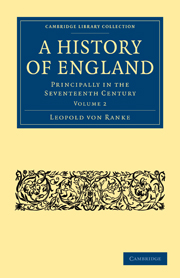Book contents
- Frontmatter
- Contents
- BOOK VI GOVERNMENT IN ENGLAND WITHOUT THE PARLIAMENT. TROUBLES IN SCOTLAND
- BOOK VII CONNEXION BETWEEN THE TROUBLES IN SCOTLAND AND THOSE IN ENGLAND AND ELSEWHERE
- BOOK VIII THE LONG PARLIAMENT AND THE KING, DOWN TO THE OUTBREAK OF THE CIVIL WAR
- BOOK IX THE ENGLISH CIVIL WAR, 1642—1646
- BOOK X INDEPENDENTS AND PRESBYTERIANS. FATE OF THE KING
- INTRODUCTION
- CHAP. I Flight of the King to the Scots
- CHAP. II Charles I at Newcastle
- CHAP. III The Parliament and Army at variance
- CHAP. IV Influence of the Agitators
- CHAP. V The so-called Second Civil War
CHAP. IV - Influence of the Agitators
Published online by Cambridge University Press: 07 June 2011
- Frontmatter
- Contents
- BOOK VI GOVERNMENT IN ENGLAND WITHOUT THE PARLIAMENT. TROUBLES IN SCOTLAND
- BOOK VII CONNEXION BETWEEN THE TROUBLES IN SCOTLAND AND THOSE IN ENGLAND AND ELSEWHERE
- BOOK VIII THE LONG PARLIAMENT AND THE KING, DOWN TO THE OUTBREAK OF THE CIVIL WAR
- BOOK IX THE ENGLISH CIVIL WAR, 1642—1646
- BOOK X INDEPENDENTS AND PRESBYTERIANS. FATE OF THE KING
- INTRODUCTION
- CHAP. I Flight of the King to the Scots
- CHAP. II Charles I at Newcastle
- CHAP. III The Parliament and Army at variance
- CHAP. IV Influence of the Agitators
- CHAP. V The so-called Second Civil War
Summary
No one could yet have said which course events would take; either opposite still seemed possible, the abolition or the complete restoration of the monarchy, exclusive domination of one religious faction or tolerance of several, continuance or abridgment of Parliament, entire supremacy of the army, or union with other powers, maintenance of the laws, or even social reform. To estimate the contrary expectations that existed it is only necessary to know that the Pope at Rome solemnly took counsel as to how far the English Catholics should be authorised to unite with the Independents. It was maintained with a certain confidence that the Independents would restore the King and the episcopal establishment, but introduce universal toleration.
The King found himself not altogether in bad hands. He was again allowed Anglican worship: some old servants, like Berkeley and Ashburnham, were permitted to be near him: his children were brought to him, his friends might visit him. He again received foreign ambassadors with a certain ceremony in the hall at Hampton Court, devoted from old times to this purpose: the commissioners who surrounded him appeared as his ministers, though forced upon him. The King asserted that he had the word of the chief officers that his crown should not be assailed: in return he had promised not to quit Hampton Court without previous reference to them. In the style used in the last generation by Cuneo, the terms of the oath of allegiance to be taken by the Catholics was then discussed between them and the King.
- Type
- Chapter
- Information
- A History of EnglandPrincipally in the Seventeenth Century, pp. 495 - 510Publisher: Cambridge University PressPrint publication year: 2010First published in: 1875



